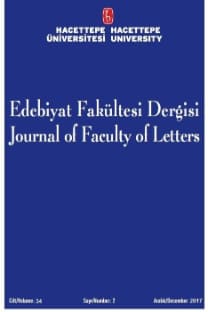Toplumruhbilimsel Betimlemeler ve Eleştirel Söylem Çözümlemesi Bağlamında "Gelinim Olur musun?" Adlı Yarışmadaki Dedikodu Nitelikli Konuşmalara Yönelik Bir İnceleme
Bu çalışmada, 'dedikodu' olarak nitelenebilecek konuşma etkinliği incelenmiştir. Çalışmanın bütüncesini bir TV kanalında sunulan "Gelinim Olur musun?" adlı yarışmada yer alan yarışmacılar arasında geçen konuşmalar oluşturmaktadır. İnceleme, yarışma evinde bireylerarası ilişkilerin oluştuğu yerel bağlam ile yarışmacıların kendilerini izleyici kitlesine tanıtarak oylarım almaya çalıştıktan rekabetçi bağlam çerçevesinde, dedikodunun yerine getirdiği işlevleri, toplumruhbilimsel betimlemeler ve eleştirel söylem çözümlemesi bağlamında belirlemeye yöneliktir. Yarışmacılar içinde yaşadıktan toplululukta hem etkin bir üye olarak kabul edilmek, hem de yarışmadan basan ile çıkabilmek konusunda dedikoduyu stratejik olarak kullanmaktadırlar.
A Study on a Speaking Activity Called Gossip in the Competition "Will You Be My Bride?" in Terms of Socio-Psychological Descriptions and Critical Discourse Analysis
This study examines a speaking activity called 'gossip'. The data is gathered from conversations of the participants of a competition called 'Gelinim Olur musun?' [Will you be my bride?], broadcast on a TV channel. The analysis aims at determining the functions of gossip in terms of socio-psychological descriptions and critical discourse analysis within the local context of the house where the interpersonal relationships are established and the competitive context where the participants try to obtain the votes of the audience by presenting themselves to them. The participants use gossip strategically in order to be accepted as an effective member within the group and to be the winner of this competition.
___
- Bergmann, Jörg. (1993). Discreet Indiscretions: The Social Organisation Of Gossip. Hathorne, New York: Aidine de Gruyter.
- Blum Kulka, Shoshana. (2000). "Gossipy events at family dinners: Negotiating sociability, presence and the moral order", Justine Coupland (ed.) SMALL TALK. London: Longman. 213-240.
- Brenneis, Donald. (1996). "Telling troubles: Narrative, conflict and experience", Chales Briggs (ed.) DISORDERLY DISCOURSE: NARRATIVE, CONFLICT AND INEQUALITY. Oxford, U.K.: Oxford UP. 41-52.
- Büyükkantarcıoğlu, Nalan. (2001). "Eleştirel söylem çözümlemesi ve toplumruh-bilim bağlamında bir metin incelemesi: İnci Aral'ın Gölgede Kırk Derece adlı öyküsü", Unsal Özünlü ve Mehmet Ali Gülel (ed.) /. DİL, YAZIN, DEYİŞBİÜM SEMPOZYUMU BİLDİRİLERİ. Denizli. 176-189.
- Caldas-Coulthard, C.R. ve M. Coulthard. (1996). Texts And Practices: Readings In Critical Discourse Analysis. London: Routledge.
- Cameron, Deborah. (1998). "Performing gender identity", Jennifer Coates (ed.) LANGUAGE AND GENDER: A READER. Oxford, U.K.:Blackwell. 270-284.
- Coates, Jennifer. (1998). "Gossip revisited: language in all-female groups". Jennifer Coates (ed.) LANGUAGE AND GENDER: A READER. Oxford, U.K.:Blackwell. 226-253.
- Coupland, Justine (ed.). (2000). Small Talk. London: Longman. Dunbar, Robin. (1996). Grooming, Gossip And The Evolution Of Language. Lon¬don: Faber and Faber.
- Duranti, Alessandro ve Charles Goodwin (ed.). (1992). Rethinking Context. Language As An Interactive Phenomenon. Cambridge, U.K.: Cambridge UP.
- Eggins, Suzanne ve Diana Slade. (1997). Analysing Casual Conversation. London: Cassell.
- Fairclough, N. (1989). Language and Power. UK: Longman.
- Fairclough, N. (1992). (ed.) Critical Language Awareness. USA: Longman.
- Fairclouhg, N. (1995). Critical Discourse Analysis: The Critical Study Of Language. NY: Longman.
- Gluckman, M. (1963). "Gossip and scandal", CURRENT ANTHROPOLOGY. 4:307-16.
- Goffman, Erving. (1959). The Presentation of Self in Everyday Life. London: Pelican Books.
- Goffman, Erving. (1974). "Frame analysis: An essay in the organisation of experience", C. Lemert ve A. Branaman (ed.) 1997. THE GOFFMAN READER. Oxford, U.K.: Blackwell. 149-166.
- Goodwin, Charels ve Marjorie Goodwin. (1992). "Assessments and the construction of context", A.Duranti ve C. Goodwin (ed.) RETHINKING CONTEXT. Cambridge, U.K.: Cambridge UP. 147-189.
- Goodwin, Marjorie. (1991). "Retellings, pretellings and hypothetical stories", RESEARCH ON LANGUAGE AND SOCIAL INTERACTION. 24: 263-276.
- Korkmaz, Zeynep. (2003). Türkiye Türkçesi Grameri: Şekil Bilgisi. Ankara: TDK yayınlan.
- Labov, William. (1972). "The isolation of contextual style", SOCIOUNGUISTIC PATTERNS. Philadelphia, Pennsylvania: Pennsylvania UP. 70-109.
- Merry, S.E. (1984). "Rethinking gossip and scandal", D.Black (ed.) TOWARD A GENERAL THEORY OF SOCIAL CONTROL Vol.1,271-302. New York: Academic Press. Paine, R. (1967). "What is gossip about? An alternative hypothesis". MAN, 2.278-85.
- Pilkington, Jane. (1998). "'Don't try and make out that I'm nice' The different strategies women and men use when gossiping", Jennifer Coates (ed.) LANGUAGE AND GENDER: A READER. Oxford, U.K.: Blackwell. 254-269.
- Sacks, Harvey. (1995). Lectures On Conversation (volumel). Oxford, U.K.: Blackwell.
- Scannell, Paddy. (2002). "Big Brother as a television event", TELEVISION AND NEW MEDIA 3: 271-282.
- Schely-Newman, Esther. (2004). "Mock intimacy: strategies of engaegement in Israeli gossip columns", DISCOURSE STUDIES. Vol. 6 (4). 471-488.
- Thornborrow, Joanna ve Deborah Morris. (2004). "Gossip as strategy: The mana¬gement of Talk about others on reality TV show 'Big Brother'". JOURNAL OF SOCIOLINGUISTICS. 8/2. 246-271.
- Van Dijk, T.A. (1985). Handbook Of Discourse Analysis. Vol. 1 ve Vol.4. Lon¬don: Academic Press.
- Wodak, R. ve B. Matouschek. (1993). "We are dealing with people whose origins one can clearly tell just by looking: Critical Discourse Analysis and the study of Neo-racism in Contemporary Australia", DISCOURSE AND SOCIETY, 4:2. 225-248.
- Wodak, R., de Cillia, R., Reisigl, M., ve K. Liebhart. (1999). The Discuruve Construction of National Identity. Edinburgh University Press.
- ISSN: 1301-5737
- Yayın Aralığı: Yılda 2 Sayı
- Başlangıç: 1983
- Yayıncı: Emine Erdoğan Özünlü
Sayıdaki Diğer Makaleler
John Millington Synge's Riders to the Sea in Terms of Epistemology
Üsküp Alaca Camii Haziresi'ndeki şahideler
Ergenlik döneminde intihar algısı: lise son sınıf gençliği örneği
Demet ULUSOY, Nilüfer ÖZCAN DEMİR, Aylin GÖRGÜN BARAN
John Millington Synge's Riders to the Sea in terms of epistemology
Göstergebilimsel yaklaşım yazınsal alanda ne denli işlevselleşebilir?
Onur Bilge KULA, Cemal SAKALLI
Kalecik'e Bağlı Bağcılıkla Uğraşan On Köyde Bireysel ve Kurumsal Açıdan Modernleşme Eğilimleri
Tuğça POYRAZ, Birsen ŞAHİN, Gülay ARIKAN
Beyin fırtınasında sosyal kimlik değişiminin üretkenlik üzerine etkisi
Kalecik'e bağlı bağcılıkla uğraşan on köyde bireysel ve kurumsal açıdan modernleşme eğilimleri
